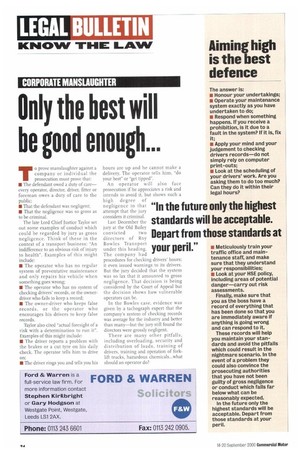Only the best will be good enough...
Page 26

If you've noticed an error in this article please click here to report it so we can fix it.
To prove manslaughter against a company or individual the prosecution must prove that:
• The defendant owed a duty of care— every operator, director, driver, fitter or foreman owes a duty of care to the public; • That the defendant was negligent; • That the negligence was so gross as to be criminal.
The late Lord Chief Justice Taylor set out some examples of conduct which could be regarded by jury as gross negligence. Think of these in the context of a transport business: "An indifference to an obvious risk of injury to health". Examples of this might include: • The operator who has no regular system of preventative maintenance and only repairs his vehicle when something goes wrong; • The operator who has no system of checking drivers' records, or the ownerdriver who fails to keep a record; • The owner-driver who keeps false records, or the operator who encourages his drivers to keep false records.
Taylor also cited "actual foresight of a risk with a determination to run it". Examples of this might include: • The driver reports a problem with the brakes or a cut tyre on his daily check. The operator tells him to drive on; • The driver rings you and tells you his hours are up and he cannot snake a delivery. The operator tells him, "do your best" or "get tipped".
An operator will also face prosecution if he appreciates a risk and intends to avoid it, but shows such a high degree of negligence in that attempt that the jury considers it criminal.
Last December the jury at the Old Bailc,
convicted two directors of Roy Bowles Transport under this heading. The company had procedures for checking drivers' hours; it even issued warnings to its drivers. But the jury decided that the system was so lax that it amounted to gross negligence. That decision is being considered by the Court of Appeal but the decision shows how vulnerable operators can be.
In the Bowles case, evidence was given by a tachograph expert that the company's system of checking records was average for the industry and better than many—but the jury still found the directors were grossly negligent.
There are many other pitfalls, including overloading, security and distribution of loads, training of drivers, training and operation of forklift trucks, hazardous chemicals.. .what should an operator do?
your peril."








































































































